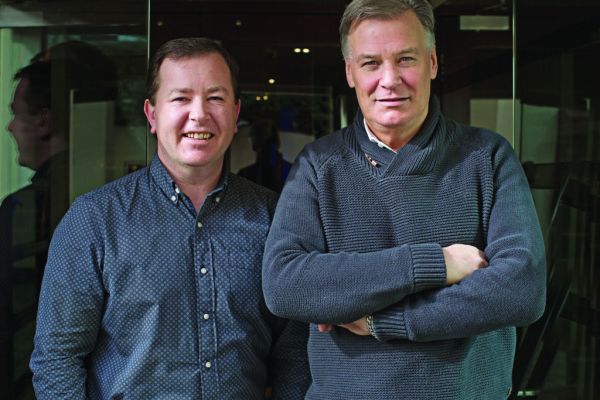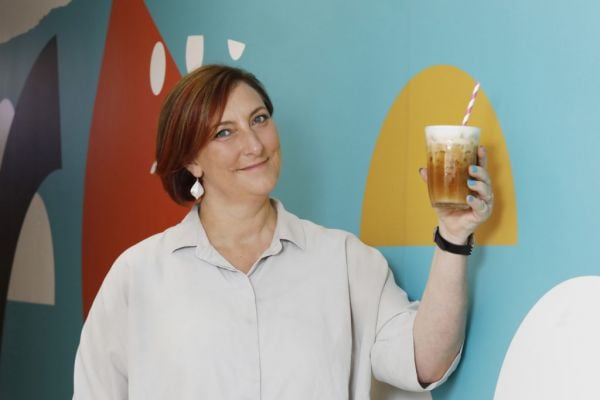Derry Clarke talks to Derek Reilly, Culinary Director for Aramark about catering for Croke Park on match days and what it take to produce a quarter of a million meals a day. Photograph by Joanne Murphy.
DC: Derek, we know each other from our days in Sodexo, when we worked together. So obviously you started there?
DR: Yes I had a great career in Sodexo. For about seven years I was Group Executive Chef for Sodexo Ireland and Northern Ireland, and in November of last year I moved to Aramark Ireland as Culinary Director. Great move; big move. You know me, I like a challenge and Aramark are the biggest and best, in my opinion, out there. Working for Frank Gleeson (managing director of Food Services), listening to his vision, it’s all about the food in Aramark. I want to use my experience to action that vision.
DC: What was the path that got you to where you are today?
DR: Well I went through the whole route of going to college, then working in fine dining restaurants, progressing on tohotels. I think I probably went through the whole system, from commis chef up to head chef, then executive chef. My introduction into corporate catering was about eight years ago, before that I didn’t know that word existed, but when I stepped into it, it was exactly what we were doing on the high street. I brought my experience from the outside world into corporate catering, to promote it and endorse it.
DC: In your end of the business, what are the biggest challenges that you have? What exactly do you do in Aramark?
DR: It’s actually a difficult question to answer because it so broad and vast. As director, anything to do with food in Aramark I’m responsible for. So that’s anything from menu and food concepts to culinary training. The challenge, like everyone else, is for value and price points, and to get it to our clients. We have over 400 clients in Southern and Northern Ireland, big clients like Croke Park, Guinness Storehouse, PWC, 3, very high-profile clients. Then we have the education industry: university campuses, UCD, UL, NUIG, etc. With a student population, they have a very different take on what they want. Then we have the healthcare sector, which is different again. So, it’s exciting due to the fact that it’s different sectors. I have to bring them all together, giving my expertise on how we do it.
DC: How do you manage 400 outlets? Do you have to go around to every one of them?
DR: Well, it’s not just me managing of course, I have a team. There is a business excellence team with great internal communications. I’d never get around to 400 sites alone, so you have to look at where you need to be, strategically. We’re producing 250,000 meals a day, spending €60 million on Irish produce. So, strategically, I’ll know where to be, where our ‘big hitters’ are. But in an average week, I probably would go to about eight or nine different sites, depending on the needs of the business.
DC: Are you hands-on still? Do you still go to a site and cook?
DR: Absolutely, I’ve come here today in my chef’s uniform and all, just in case! I just did a function for Fáilte Ireland, fine dining for 40 people. That will never be far away from me. I can’t just preach to the chefs, I need to be in there and doing it myself. So yes, hands-on cooking, absolutely.
DC: You mentioned Croke Park, match days must be a nightmare?
DR: It can be, but the executive chef has been there a couple of years now, and he knows it inside-out. Obviously it’s very busy, cooking top quality food. But it’s about logistics in there as well. Getting the right food to the right box at the right time. To the outside world it looks like ‘how do they do that?’ but when you have a well-organised team it’s executed – I won’t say ‘simply’ – but definitely very professionally.
DC: Have you seen a big difference in the last year in the industry?
DR: Yes, people’s attitudes have changed towards food; food is emotional. Yes, they’re looking for value, they’re looking for price points, but I think over the last couple of months they are looking for ‘different’ as well. People are busier so they’re looking for you to make the choice for them, but their appetites have broadened.
DC: What does an average day entail for you?
DR: I’m based in the head office Malahide but for obvious reasons I’m not there that much. I could be in Galway one day and Belfast the next. I work off a diary but it changes literally every hour, I get a phone call saying I need to go one place or the other. It could be to meet a supplier or to do hands-on cooking or to meet a client or to promote the company. It’s exciting – every day is different. There are no set hours or set days on it either, that’s the nature of the business.
DC: You once told me your main competitors are the restaurants and coffee shops across the road from wherever you client is, is that still the case?
DR: Absolutely, most of our clients are quite high profile sites in the middle of Dublin or Cork city centre where you can just walk outside to an oasis of food outlets. So we get the best value from our budget and up-skill the chefs to teach to them innovate with what we have. But I don’t see it like we’re going into competition with them, rather that they go into competition with us. We want to be first off the mark.
DC: Do you find it more challenging working with a tight budget than with a generous one?
DR: No I think with a generous budget in some ways you can lose sight of it, you can get complacent. When you have structures and monetary restraints around a menu it makes you dig deeper as a chef to see if you can innovate or fuse it with something else.
DC: I think now more people are staying in the workplace to eat as the working day changes.
DR: Yes, and we have to respond to that. The old ‘canteen’ doesn’t exist anymore. When you walk in to one of our restaurants, you see that – from the soft furnishings to the live cooking to the whole layout. All our chefs are out front, there's no more cooking in the back. You'd be blown away with how well laid-out some of our restaurants are, which is an endorsement of the clients we work with, that they're willing to invest so much. But food is fuel for the staff; if they're happy, they're going to be productive.









